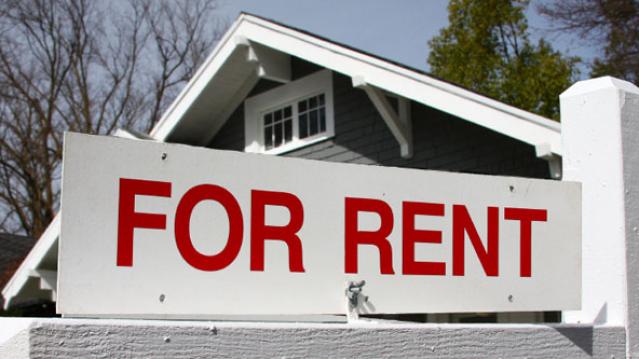More Americans Struggling to Pay the Rent

As the portion of Americans renting rather than owning their homes has grown in recent years, so has the number of Americans for whom the monthly rent check has become a burden.
In 2013, almost half of all renters were spending more than 30 percent of their income on housing, with more than a quarter paying half their income to their landlord, according the "State of the Nation’s Housing 2015" report issued today by the Harvard Joint Center for Housing Studies.
Rising rents aren’t just impacting low-income consumers. One in five renters earning $45,000-$75,000 is paying at least a third of their income in rent.
Related: There’s Only One Way Rents Will Go: Sky High
The increase in rental rates represents a byproduct of the falling home ownership rate, which dropped to 63.7 percent in the first quarter of this year, the lowest level since 1989. The rate has fallen for the past eight years and appears poised to continue its decline.
That puts the 2010s on pace to be the strongest decade for rental growth in history, and the national vacancy rate fell to just 7.6 percent, its lowest level in 20 years, according to the Harvard report. The trend reflects increased demand from millennials, as well as a growing preference for renting in households aged 45-64 and higher-income households.
Rents rose 3.2 percent last year, twice the rate of overall inflation, spurring builders to begin construction on more multi-family units than in any years since 1989. “And if job growth continues to pick up, we could see even more demand, as young adults move out of their parents’ homes and into their own apartments,” Joint Center senior research associate Daniel McCue said in a statement.
Marco Rubio Says There’s No Proof Tax Cuts Are Helping American Workers

Sen. Marco Rubio (R-FL) told The Economist that his party’s defense of the massive tax cuts passed last year may be off base: “There is still a lot of thinking on the right that if big corporations are happy, they’re going to take the money they’re saving and reinvest it in American workers,” Rubio said. “In fact they bought back shares, a few gave out bonuses; there’s no evidence whatsoever that the money’s been massively poured back into the American worker.”
For Richer or Poorer: An Updated Marriage Bonus and Penalty Calculator

The Tax Policy Center has updated its Marriage Bonus and Penalty Calculator for 2018, including the new GOP-passed tax law. The tool lets users calculate the difference in income taxes a couple would owe if filing as married or separately. “Most couples will pay lower income taxes after they are married than they would as two separate taxpayers (a marriage bonus), but some will pay a marriage penalty," TPC’s Daniel Berger writes. “Typically, couples with similar incomes will be hit with a penalty while those where one spouse earns significantly more than the other will almost always get a bonus for walking down the aisle.”
Trump Administration Wants to Raise the Rent

Housing and Urban Development Secretary Ben Carson will propose increasing the rent obligation for low-income households receiving federal housing subsidies, as well as creating new work requirements for subsidy recipients. Some details via The Washington Post: “Currently, tenants generally pay 30 percent of their adjusted income toward rent or a public housing agency minimum rent not to exceed $50. The administration’s legislative proposal sets the family monthly rent contribution at 35 percent of gross income or 35 percent of their earnings by working 15 hours a week at the federal minimum wage -- or approximately $150 a month, three times higher than the current minimum.” (The Washington Post)
New Push for Capital Gains Tax Cut

Anti-tax activists in Washington are renewing their pressure on lawmakers to pass new legislation indexing capital gains taxes to inflation. The Hill provided an example of such indexing that Grover Norquist recently sent to Treasury Secretary Steven Mnuchin: “Under current policy, someone who made an investment of $1,000 in 2000 and sold it for $2,000 in 2017 would pay capital gains taxes on the $1,000 difference. But if capital gains were indexed, the investor would only pay taxes on $579, since $1,000 in 2000 would be equivalent to $1,421 in 2017 after adjusting for inflation.” Proponents of indexing say it’s just a matter of fairness, but critics claim that it would be just another regressive tax cut for the wealthy. Indexing would cost an estimated $10 billion a year in lost revenues. (The Hill)
Bernie Sanders to Propose Plan Guaranteeing a Job for Every American

Sen. Bernie Sanders (I-VT) is preparing to announce a plan for the federal government to guarantee a job paying $15 an hour and providing health-care benefits to every American “who wants one or needs one.” The jobs would be on government projects in areas such as infrastructure, care giving, the environment and education. The proposal is still being crafted, and Sanders’ representative said his office had not yet come up with a cost estimate or funding plan. Sen. Kirsten Gillibrand (D-NY) last week tweeted support for a federal jobs guarantee, but Republicans have long opposed such proposals, saying they would cost too much. (Washington Post)
